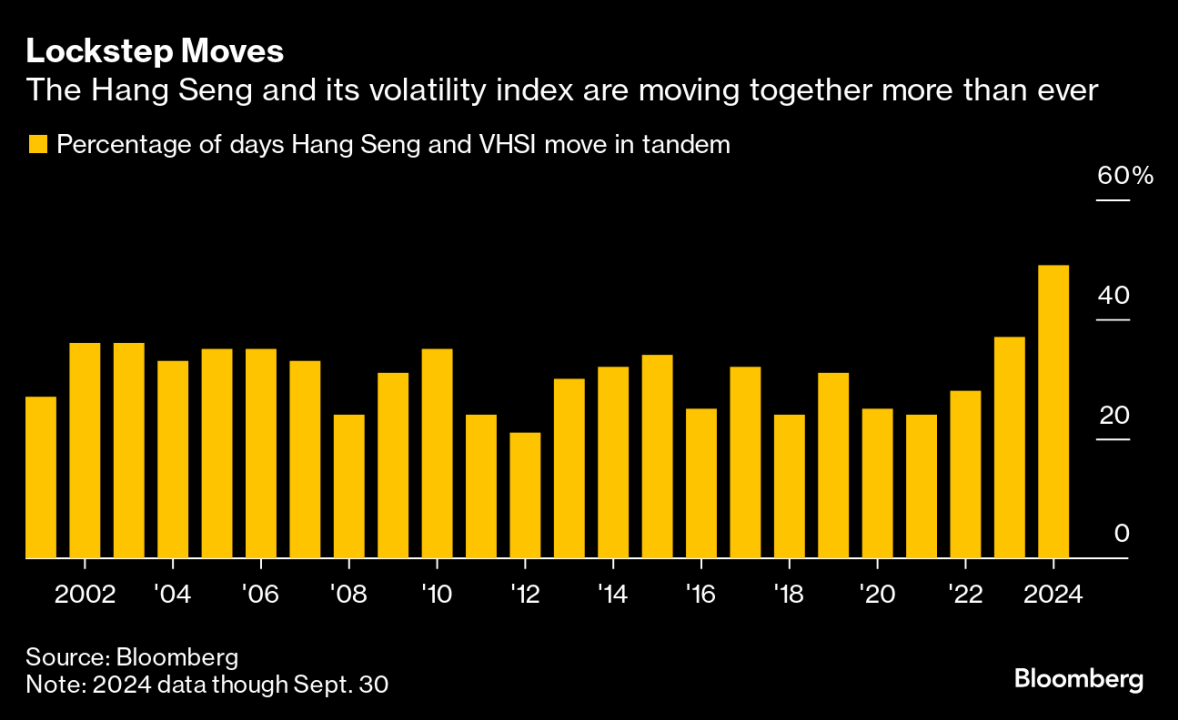The Hang Seng Index has experienced a dramatic surge today, jumping 8% to reach a 22-month high of 22,450. This marks the sixth consecutive day of gains, fueled by China's recent stimulus measures and optimism about further economic support. The index's 1,268-point gain is the largest single-day jump since November 2022, with the benchmark now up 23% over the past six trading days.
The Hang Seng's resilience comes despite mixed economic data and ongoing concerns about China's property sector. This rally has been primarily driven by Beijing's latest round of stimulus measures, which represent the most significant economic support package since the early days of the COVID-19 pandemic. The People's Bank of China (PBOC) has taken aggressive steps to boost the economy and stabilize financial markets.
Key components of the stimulus package include:
- Interest rate cuts: The PBOC cut reverse-repo rate from 1.7% to 1.5%.
- Reserve Requirement Ratio (RRR) reduction: A 0.5% cut in the RRR, effectively injecting 1 trillion RMB ($142 billion) into the banking system.
- Stock market support: An unprecedented 800 billion RMB fund for capital markets, including funds to lend to companies for share buybacks and to non-bank financial institutions to purchase Chinese equities.
- Property market measures: Mortgage rates for existing home loans have been cut by roughly 0.5 percentage points, and the nationwide minimum down payment requirement for second homes has been reduced from 25% to 15%.
- Fiscal stimulus: China's Politburo has announced plans to step up fiscal spending, although details are yet to be released.

The Hang Seng's resilience comes despite mixed economic data and ongoing concerns about China's property sector. This rally has been primarily driven by Beijing's latest round of stimulus measures, including interest rate cuts, lower bank reserve requirements, and relaxed rules for homebuyers in major cities. More than US$770 billion in market value has been restored to Hong Kong stocks, according to Bloomberg data.

Tech stocks have been leading the charge, with Meituan surging 14%, JD.com jumping 12%, and Baidu rallying 11%. Property developers have also seen significant gains, with Longfor surging 26% and China Resources Land jumping 10.1%. The EV sector has performed well too, with Li Auto advancing 11.9% and BYD rallying 7.1%.
The robust half-day turnover of HK$235.4 billion indicates strong investor participation, with many traders rushing to snap up stocks for fear of missing out on the upsurge. This "FOMO" sentiment has been a key driver of the recent rally, although some analysts caution that the current euphoria may not be sustainable long-term.
Adding to the complex market picture is the divergence between Hong Kong and other Asian markets. While Hong Kong stocks soared, other Asian markets traded lower amid rising tensions in the Middle East. Japan's Nikkei 225 Index lost 1.5% and South Korea's Kospi Index weakened 0.4%, highlighting the unique nature of Hong Kong's rally.
For traders and investors, key factors to watch in the coming days include:
- The effectiveness of China's stimulus measures in boosting real economic growth.
- Further policy support, particularly fiscal measures to boost consumption.
- Developments in the property sector, which remains a key concern for the Chinese economy.
- Global factors, including geopolitical tensions and actions by major central banks.
- This week's economic data releases from China, including services PMI and trade figures.
Hang Seng Index prices are likely to remain sensitive to these developments, as well as to any shifts in Chinese policy expectations. The index's recent movement has pushed it into bull market territory, defined as a 20% rise from recent lows. However, the overall trend remains uncertain, supported by policy measures but challenged by underlying economic weaknesses.
While there's potential for further gains, analysts suggest the market may experience increased volatility in the coming weeks as investors digest the impact of recent policy changes and await additional economic data. The sustainability of this bull run will largely depend on whether the stimulus measures can translate into tangible improvements in China's economic fundamentals.
Hang Seng Index (D1 interval)
HK.cash is approaching the 50% Fibonacci retracement level, which previously acted as strong resistance and led to significant trend reversals. The RSI is nearing a bullish trendline that began in August 2023, while the MACD has dropped to levels last seen in mid-2015. Both oscillators are signaling oversold conditions. The key level for bulls is 22,845; a failure to break this resistance could give bears the momentum to target the 61.8% Fibonacci retracement at 20,891. For further movement, monitoring hedge fund flows will be crucial to assess market positioning. Source: xStation


Daily summary: Silver plunges 9% 🚨Indices, crypto and precious metals under pressure

US100 loses 1.5% 📉

US Open: Cisco Systems slides 10% after earnings 📉 Mixed sentiments on Wall Street

Market Wrap: UK Stagnation, Tariffs Weigh on Giants, and Crypto Stabilizes
The content of this report has been created by XTB S.A., with its registered office in Warsaw, at Prosta 67, 00-838 Warsaw, Poland, (KRS number 0000217580) and supervised by Polish Supervision Authority ( No. DDM-M-4021-57-1/2005). This material is a marketing communication within the meaning of Art. 24 (3) of Directive 2014/65/EU of the European Parliament and of the Council of 15 May 2014 on markets in financial instruments and amending Directive 2002/92/EC and Directive 2011/61/EU (MiFID II). Marketing communication is not an investment recommendation or information recommending or suggesting an investment strategy within the meaning of Regulation (EU) No 596/2014 of the European Parliament and of the Council of 16 April 2014 on market abuse (market abuse regulation) and repealing Directive 2003/6/EC of the European Parliament and of the Council and Commission Directives 2003/124/EC, 2003/125/EC and 2004/72/EC and Commission Delegated Regulation (EU) 2016/958 of 9 March 2016 supplementing Regulation (EU) No 596/2014 of the European Parliament and of the Council with regard to regulatory technical standards for the technical arrangements for objective presentation of investment recommendations or other information recommending or suggesting an investment strategy and for disclosure of particular interests or indications of conflicts of interest or any other advice, including in the area of investment advisory, within the meaning of the Trading in Financial Instruments Act of 29 July 2005 (i.e. Journal of Laws 2019, item 875, as amended). The marketing communication is prepared with the highest diligence, objectivity, presents the facts known to the author on the date of preparation and is devoid of any evaluation elements. The marketing communication is prepared without considering the client’s needs, his individual financial situation and does not present any investment strategy in any way. The marketing communication does not constitute an offer of sale, offering, subscription, invitation to purchase, advertisement or promotion of any financial instruments. XTB S.A. is not liable for any client’s actions or omissions, in particular for the acquisition or disposal of financial instruments, undertaken on the basis of the information contained in this marketing communication. In the event that the marketing communication contains any information about any results regarding the financial instruments indicated therein, these do not constitute any guarantee or forecast regarding the future results.


